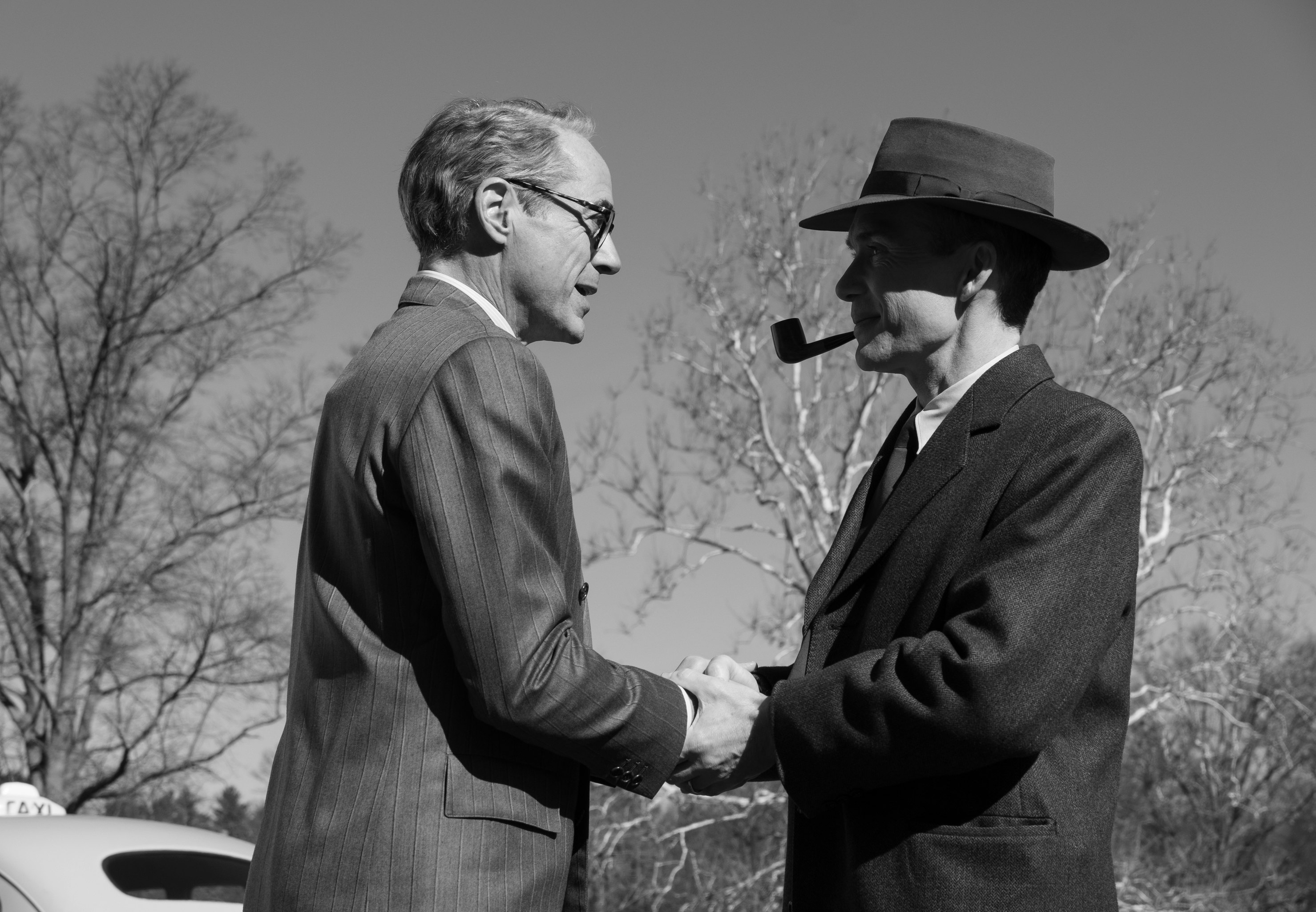
On July 16, 1945, at 5:29 a.m., the world changed forever. The Trinity Test (aka the world’s first nuclear explosion), carried out in secret on a plot of empty land smack dab in the middle of New Mexico and overseen by Julius Robert Oppenheimer, proved the atomic bomb was a viable weapon of mass destruction. You can draw a direct line from that moment to the bombs dropped in Hiroshima and Nagasaki, the nuclear arms race that defined the Cold War, and the looming threat of self-assured nuclear annihilation that persists even today.
So you might naturally think that the Trinity Test would be the most important scene in Oppenheimer, Christopher Nolan’s new movie about the so-called father of the atomic bomb. And in a way, it is. The explosion serves as the film’s climax, a visual gut punch that releases two hours of tension and kicks off Oppenheimer’s unexpected third act. But in another sense, that fateful test is the least important part of the movie: a brief detour into blockbuster spectacle in what’s otherwise Nolan’s most grounded, contemplative, and beautiful film to date.

Oppenheimer plays out on three parallel tracks, though its structure becomes clearer as the movie chugs tirelessly forward. The core story follows Robert Oppenheimer (Cillian Murphy giving the performance of his life in the role he was apparently born to play) as he matures from a directionless physics student to one of the most brilliant minds of his generation. It’s not long before he’s recruited by Lt. Gen. Leslie Richard Groves (Matt Damon sporting a killer mustache) to lead the Manhattan Project as America races to build a nuke faster than the Nazis.
The story jumps rapidly between time and space as Oppenheimer assembles a team of scientists as formidable as any superhero ensemble. But while most of the drama plays out in drab meeting rooms and scribbled-on whiteboards, Nolan uses swirling practical effects (fire, stars, and light commingle in a haunting cosmic dance) to illuminate both the theoretical physics and the chaos that exists within his protagonist’s head.

Providing some loose narrative framework are a pair of secondary plotlines set in the film’s future. In one, Oppenheimer answers leading questions about his Communist ties in a government hearing designed to humiliate him. (In other scenes, we see him flirting with Communism and working to organize his fellow academics in an unexpected parallel to the actor and writer strikes currently grinding Hollywood to a halt.)
In another, Oppenheimer’s rival Lewis Strauss (Robert Downey Jr. doing some of his best acting in decades) finds himself in a heated political battle to become U.S. secretary of commerce.
If that last bit sounds boring, don’t worry: Downey sells it with a series of speeches that put his best Iron Man monologue to shame. The story of Strauss, with its many twists and deceptions, transforms Oppenheimer from moody biopic into gripping legal thriller, fusing the best parts of Nolan’s original mind-bender Memento with all the technical skills and Hollywood might he’s accumulated in the decades since. (In a nod to Memento, Downey’s scenes play out in black and white, denoting that they’re the only ones not shown to us through Oppenheimer’s own perspective.)

Eventually, at roughly the two-hour mark if you’re wondering, Oppenheimer gets to the explosion. Nolan builds tension masterfully, slathering it on like the scientists applying sunscreen as they prepare to bathe in their bomb’s nuclear glow. But when the moment comes, it’s almost anti-climactic. Nolan isolates the individual elements: blinding light, a tower of fire, and finally, a sonic boom. Combined, they are death incarnate, but individually, they may fail to impress.
And yet, I can’t help but feel that’s the point of Oppenheimer. This is not a celebration of scientific ingenuity, American might, or even the defeat of evil. (The movie makes it clear that the Nazis were already defeated before the Trinity Test and the Japanese were likely close to surrender.) Rather, it’s a brutal condemnation of everyone and everything that helped make nuclear weapons a reality.
As the movie’s final act slowly whirs to life (audiences may groan briefly when they realize there’s still an hour left after the explosion), Robert Oppenheimer transforms into an anti-war activist. But it’s too little too late, and Nolan makes this clear: Oppenheimer is no redemption story.

While the trio of Murphy, Damon, and Downey carry the weight of Nolan’s vision on their backs, Oppenheimer’s entire ensemble cast deserves praise. When the movie was first announced, it seemed the director was simply scooping up every star he could find (Rami Malek! Florence Pugh! Josh Hartnett! Benny Safdie!), but each actor seems born to play their given role.
Safdie is a clear standout as Edward Teller, a rogue Manhattan Project scientist whose work leads to the even deadlier hydrogen bomb. Emily Blunt also shines as Oppenheimer’s wife Kitty, despite not being given a ton of depth beyond a drinking problem and one stellar scene. And Gary Oldman’s brief portrayal of Harry Truman as a truly deplorable human being is one for the history books.
But the true star of Oppenheimer is history itself, both in the movie’s slavish devotion to it and in the harsh truths it so often uncovers.

After making his name with a trio of Batman movies followed by a trio of science fiction epics, Nolan’s ability to craft a biopic wasn’t a sure thing. On my way to the theater, I worried this would be 2.5 hours of boring dialogue followed by one spectacular explosion. (Instead, it turned out the opposite was true.) After watching Oppenheimer, I’d trust Nolan to direct a movie about the inventor of the doorknob if that’s what he wants to do next.
Oppenheimer is a tour de force. An unmatched director at the top of his game throwing off the shackles of science fiction and superheroes to tell the raw story of one man’s transformation into something both more and less than a human being. It’s a potent political allegory and a surprisingly timely endorsement of workers’ rights. But more than anything else, Oppenheimer is a damn good movie.







